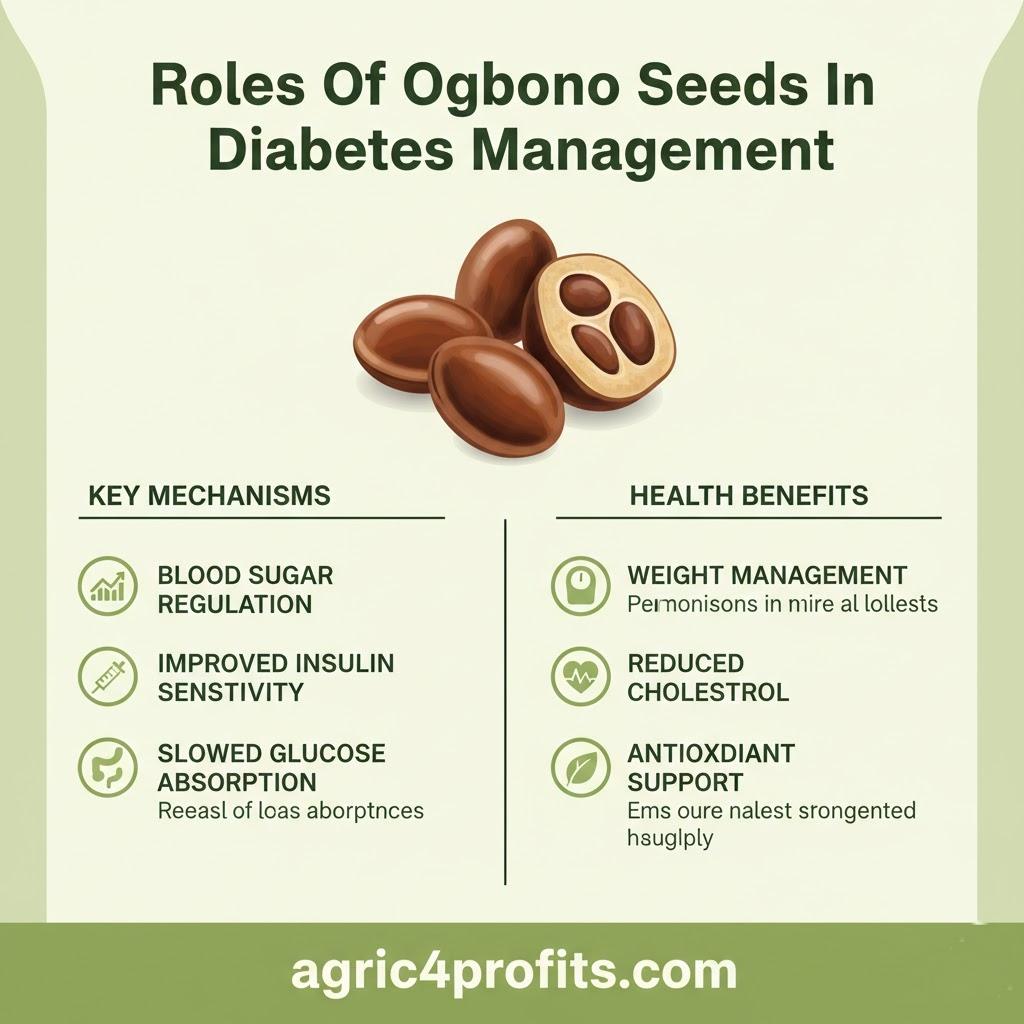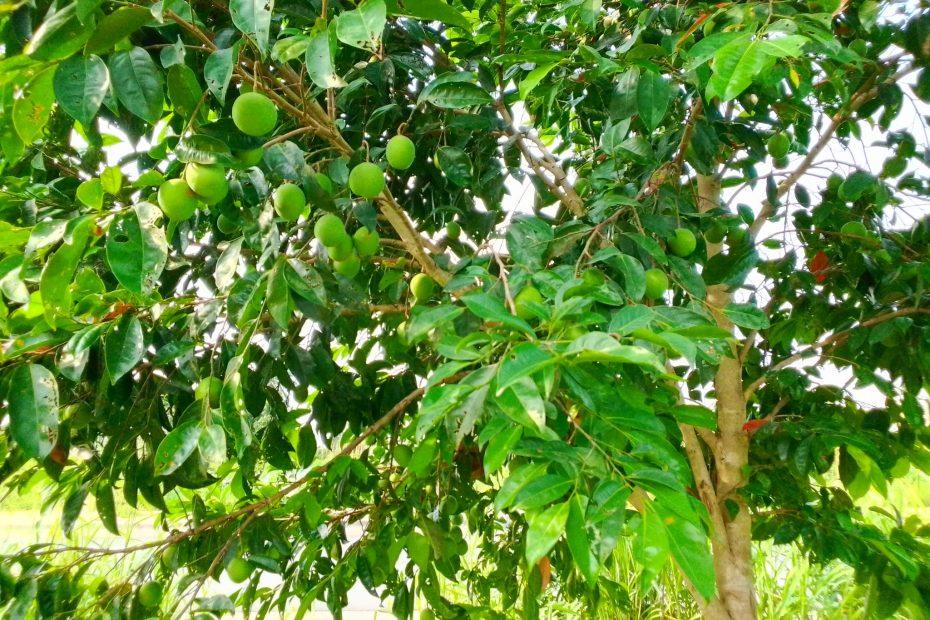Ogbono seeds, derived from the Irvingia gabonensis tree, have gained attention for their potential role in diabetes management. Native to West Africa, these seeds are traditionally used as a thickener in soups and stews. Rich in fiber, proteins, and healthy fats, they offer nutritional benefits that may support blood sugar control.
The high dietary fiber content, particularly soluble fiber, slows carbohydrate absorption, helping prevent post-meal blood glucose spikes. This contributes to more stable glycemic levels throughout the day.
Compounds in Ogbono seeds may enhance insulin sensitivity, allowing better glucose utilization and potentially reducing diabetes-related complications.
Ogbono also aids weight management by promoting satiety through fiber and protein, which can lower calorie intake and combat insulin resistance linked to obesity.
Additionally, the seeds provide essential nutrients like magnesium, potassium, and zinc, supporting metabolic health. Their low glycemic index makes them suitable for diabetic diets.
Ogbono seeds are versatile and easy to incorporate into meals, enhancing flavor while aligning with dietary needs for diabetes management.
While promising, Ogbono should complement—not replace—medical treatments. Consult healthcare providers before use, especially with medications.
Nutritional Profile of Ogbono Seeds
1. High in Healthy Fats: Rich in unsaturated fatty acids that support heart health and lower bad cholesterol.
2. Good Source of Protein: Provides significant protein for muscle repair and metabolic functions.
3. Rich in Fiber: High fiber promotes digestion, satiety, blood sugar regulation, and weight management.
4. Vitamins and Minerals: Contains vitamin A, vitamin C, calcium, and magnesium for immunity, bones, and metabolism.
5. Low Glycemic Index: Minimal impact on blood sugar, ideal for diabetes control.
Mechanisms of Action in Blood Sugar Regulation
1. Slowing Carbohydrate Absorption: Soluble fiber delays carb uptake, stabilizing post-meal glucose.
2. Enhancing Insulin Sensitivity: Compounds improve cellular glucose use and reduce resistance.
3. Promoting Satiety: Fiber and protein reduce hunger and calorie intake for better control.
4. Regulating Glucose Production: May modulate liver glucose output for balanced levels.
5. Antioxidant Activity: Protects pancreatic cells from oxidative stress for sustained insulin function.
Antioxidant Properties of Ogbono Seeds
1. Rich in Polyphenols: Neutralize free radicals and reduce oxidative stress.
2. Protecting Cellular Health: Shields cells from damage and supports longevity.
3. Anti-inflammatory Effects: Lowers inflammation linked to chronic conditions.
4. Supporting Immune Function: Enhances defense against infections via reduced stress.
5. Potential Cancer Prevention: May protect DNA and lower certain cancer risks.
Read Also: 12 Medicinal Health Benefits of Oats (Avena Sativa)
Dietary Fiber Content and Its Impact on Diabetes

1. High Dietary Fiber: Soluble fiber slows digestion and prevents glucose spikes.
2. Improved Glycemic Control: Promotes gradual blood sugar rise for stability.
3. Enhanced Satiety: Reduces overeating and supports weight goals.
4. Lower Insulin Resistance: Boosts insulin effectiveness.
5. Gut Health Benefits: Feeds beneficial bacteria for metabolic support.
Ogbono Seeds and Weight Management
1. Low-Calorie Density: Nutrient-rich with moderate calories for controlled intake.
2. High Fiber Content: Increases fullness to curb snacking.
3. Protein Source: Maintains muscle and boosts metabolism during loss.
4. Stabilized Blood Sugar Levels: Prevents cravings from energy crashes.
5. Nutrient-Rich: Provides essentials while aiding caloric balance.
Glycemic Index of Ogbono Seeds
1. Low Glycemic Index: Minimal blood sugar impact.
2. Gradual Energy Release: Sustains stable levels all day.
3. Comparisons to Other Foods: Better choice than high-GI options.
4. Meal Pairing Benefits: Lowers overall meal glycemic load.
5. Long-Term Benefits: May reduce type 2 diabetes risk.
Ogbono Seeds in Traditional Medicine
1. Historical Use: Valued in West Africa for nutrition and medicine.
2. Treatment of Diabetes: Used traditionally to regulate blood sugar.
3. Antioxidant Properties: Combats stress and inflammation holistically.
4. Digestive Health: High fiber aids gut function.
5. Cultural Significance: Integral to rituals beyond food.
Research Studies on Ogbono Seeds and Diabetes
1. Blood Sugar Regulation Studies: Fiber reduces post-meal spikes.
2. Antioxidant Effects: Lowers oxidative stress in diabetes.
3. Animal Studies: Improves glucose levels and insulin sensitivity.
4. Nutritional Analysis: Confirms fiber, protein, and fat benefits.
5. Traditional Use Validation: Supports folk remedies with science.
Read Also: 12 Medicinal Health Benefits of Emilia Sonchifolia (lilac tasselflower)
Incorporating Ogbono Seeds into a Diabetic Diet

1. Ogbono Soup: Traditional vegetable and protein-rich dish.
2. Smoothies and Powders: Add to low-GI blends for nutrition.
3. Baking: Incorporate into breads or muffins for fiber boost.
4. Sprinkling on Salads: Adds texture without major changes.
5. Portion Control: Monitor intake for calorie management.
Potential Side Effects and Considerations
1. Allergic Reactions: Watch for rashes or distress initially.
2. Gastrointestinal Issues: Introduce gradually to avoid discomfort.
3. Caloric Density: Balance to prevent excess calories.
4. Interactions with Medications: Check with doctor if on diabetes drugs.
5. Not a Substitute for Medical Treatment: Use as complement only.
Scientific Evidence and Case Studies on Roles Of Ogbono Seeds In Diabetes Management

1. Blood Sugar Regulation: Soluble fiber slows carb absorption, reducing postprandial spikes.
2. Insulin Sensitivity Improvement: Extracts enhance insulin action in studies.
3. Weight Loss Support: Fiber promotes satiety and aids weight reduction.
4. Antioxidant Protection: Polyphenols combat oxidative stress in diabetic models.
5. Glycemic Control: Low GI contributes to stable levels in nutritional analyses.
Summary of Roles Of Ogbono Seeds In Diabetes Management
| Aspect | Key Details |
|---|---|
| Scientific Name | Irvingia gabonensis |
| Primary Form | Ground seeds/powder for soups, stews, or additions |
| Key Nutrients | High soluble fiber, healthy fats, protein, magnesium, potassium, zinc |
| Main Benefits for Diabetes | Slows carb absorption, improves insulin sensitivity, promotes satiety/weight loss, low GI, antioxidant protection |
| Mechanisms | Fiber delays glucose uptake, enhances insulin use, reduces oxidative stress |
| Traditional Use | West African remedies for blood sugar and digestive health |
| Incorporation Methods | Soups, smoothies, baking, salads |
| Cautions | Possible GI issues, allergies, medication interactions; not a replacement for treatment; consult professionals |
Frequently Asked Questions
1. What makes Ogbono seeds helpful for diabetes management?
Ogbono seeds are high in soluble fiber, which slows carbohydrate absorption and helps prevent blood sugar spikes.
2. How does fiber in Ogbono seeds affect blood glucose?
Soluble fiber delays sugar absorption, leading to gradual increases in blood glucose and better overall control.
3. Can Ogbono seeds improve insulin sensitivity?
Yes, compounds in the seeds may enhance insulin sensitivity, allowing better glucose utilization by cells.
4. Do Ogbono seeds aid in weight loss for diabetics?
Yes, their fiber and protein promote satiety, reduce calorie intake, and support weight management to combat insulin resistance.
5. What is the glycemic index of Ogbono seeds?
Ogbono seeds have a low glycemic index, causing minimal and gradual effects on blood sugar levels.
6. Are there antioxidants in Ogbono seeds beneficial for diabetes?
Yes, polyphenols and other antioxidants reduce oxidative stress and protect pancreatic cells involved in insulin production.
7. How can I incorporate Ogbono seeds into a diabetic diet?
Use them in soups, smoothies, baked goods, or sprinkled on salads for added nutrition without major blood sugar impact.
8. Are there any side effects of consuming Ogbono seeds?
High fiber may cause GI discomfort if introduced suddenly; allergies are possible, and portion control is key due to calorie density.
9. Should Ogbono seeds replace diabetes medication?
No, they are a dietary complement only—consult a healthcare provider before use, especially with medications.
10. What does research say about Ogbono seeds for diabetes?
Studies show benefits in blood sugar regulation, insulin sensitivity, and antioxidant effects, often validating traditional uses in animal and nutritional research.
Do you have any questions, suggestions, or contributions? If so, please feel free to use the comment box below to share your thoughts. We also encourage you to kindly share this information with others who might benefit from it. Since we can’t reach everyone at once, we truly appreciate your help in spreading the word. Thank you very much for your support and for sharing!
Disclaimer: This article is for educational and informational purposes only. The health benefits described are based on scientific research and traditional knowledge. They ayre not a substitute for professional medical advice, diagnosis, or treatment. Always consult a healthcare professional before using any herb or natural remedy for medical purposes.
Read Also: Importance and Need for Financial Literacy (Financial Education)

